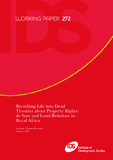Literature Review of Governance and Secure Access to Land
Includes why is secure access to land important; secure property rights, economic growth and social justice; the scale of insecure access to land; political contestation; the role of donors; IIED v FIG, contrasting ways of looking at land issues; governance and corruption; recourse to legal remedies; struggling for urban survival; aid instruments; lessons and recommendations from the literature – the IIED school, FAO and EU guidelines.





